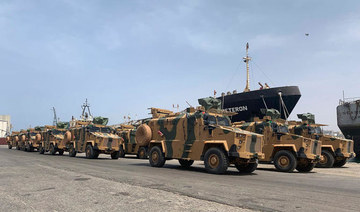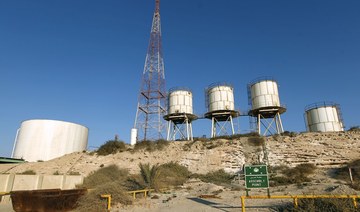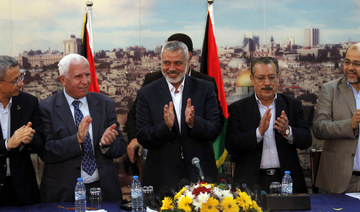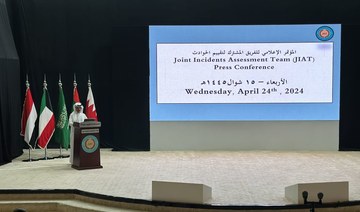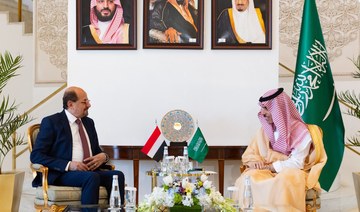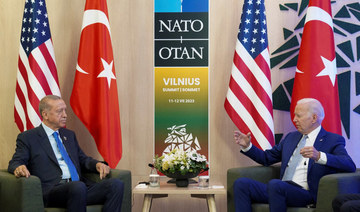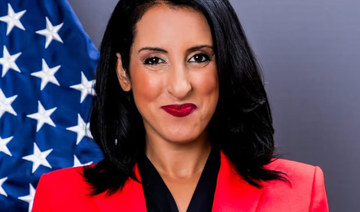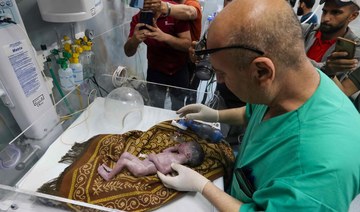BENGHAZI: After years of assassinations, bombings and militia firefights, Libya’s eastern city of Benghazi finally feels safe again — but security has come at a heavy cost.
Uniformed police are out at major intersections, cafes and restaurants stay open late into the night, and local groups hold art exhibitions and festivals. But the city center lies in ruins, thousands remain displaced, and forces loyal to commander Khalifa Haftar, who now controls eastern Libya, have cracked down on dissent.
Benghazi offers a glimpse of what may befall the capital, Tripoli, where Haftar’s forces launched an offensive last month against rival militia loosely allied with a weak, UN-recognized government. Its fate could also harden the resolve of Haftar’s opponents — who view him as an aspiring dictator — and further imperil UN efforts to peacefully reunite the country.
Haftar’s forces have met stiff resistance on the outskirts of Tripoli, and experts say that despite considerable international support, he is unlikely to succeed in defeating his rivals in the west or unifying the country. They point out that even in the east, his forces rely on local militia as well as Salafists.
Benghazi was the epicenter of the Arab Spring uprising in 2011 that toppled and killed long-ruling dictator Muammar Qaddafi. But in the years after his ouster, the city and much of the country came to be ruled by a patchwork of armed groups: local and tribal militias, nationalist and mainstream extremist groups, as well as Al-Qaeda and Daesh. Extremists attacked the US Consulate in Benghazi on September 11, 2012, killing US Ambassador Chris Stevens and three other Americans.
Haftar served as a senior officer under Qaddafi but defected in the 1980s during the ruinous war with Chad, in which he and hundreds of soldiers were captured in an ambush. He later spent more than two decades in the suburbs of Washington, where he is widely believed to have worked with the CIA, before returning to join the uprising in 2011. He eventually built up forces known as the Libyan National Army.
In February 2014, he declared the start of an operation to root out the militia and unify the country. Four months later, when it appeared they would lose influence in a disputed election, extremist and other factions in Tripoli launched an attack on their rivals, eventually splitting the country into rival authorities in the east and west, each beholden to an array of militia6.
“Back to normal”
Haftar’s prominence rose as his forces battled extremists and other rival factions across eastern Libya, and the parliament there eventually recognized him as the head of its armed forces, giving him the rank of field marshal.
He also gained the support of Egypt and the United Arab Emirates, as well as France and Russia, all of which came to see him as a key ally against extremists and are widely believed to have provided weapons and other support despite a UN arms embargo. His opponents in western Libya are believed to have gotten aid from Qatar and Turkey.
Today his forces are firmly in control of the country’s east, and the near-daily assassinations, abductions and shootings that once terrified Benghazi’s residents are a thing of the past. Billboards and posters showing Haftar in full military regalia line the streets — with so many placed along the airport road that many jokingly refer to the display as Haftar’s Instagram page.
“In 2019 we have recorded no terrorist attacks or assassinations in Benghazi, which was a daily event back before the LNA took control over the city,” said Maj. Tarek Alkarraz, spokesman for the Interior Ministry in the east. He added that the city of Derna, which was under Daesh control, was similar. “Now life is back to normal and it’s safe and secure.”
Streets are cleaner, garbage is being collected and the electricity cuts out far less often than it did at the height of the fighting. Outside the devastated city center, modern shopping malls have sprung up, as well as upscale seafood and Turkish restaurants. Local ride-booking services are modeled on Uber and Careem.
“The only thing that matters is safety, which we are enjoying, thank God,” said Wanees Amgadah, a retired teacher. “The whole east, and God willing even the west, will be safe with the help of God, thanks to our soldiers.”
Inspired by Egypt’s El-Sisi
Haftar has modeled his rule on that of President Abdel-Fattah El-Sisi, his close ally in neighboring Egypt, who led the overthrow of an elected but divisive president in 2013. Both have declared war on terrorism. El-Sisi has launched an unprecedented crackdown on dissent, jailing thousands of people and heavily restricting independent media and civil society.
“The LNA primarily emphasize stability and deem the Muslim Brotherhood and their allies and associates as a security threat,” said Claudia Gazzini, a Libya expert at the International Crisis Group. “This is a very vague term and this brand could be slapped on anyone who opposes the LNA.”
A human rights activist in Benghazi, who spoke on condition of anonymity for fear of reprisal, said the security forces are more aggressive than at any point since Qaddafi’s time, restricting the movement of activists and NGO workers, and regularly bringing them in for interrogation.
In a report issued last month, the Tripoli-based Libyan Center for Freedom of the Press documented 29 attacks on reporters by Haftar’s forces over the past year and a half, more than any other armed group. Haftar’s forces “prohibit all the media and journalists who are not loyal to it, and thus totally curtail all civilian state aspects in eastern Libya,” it said.
The report said more than 80 journalists have fled the country since 2014. Across Libya, it said, “journalists now face one of three options: to work under threat, or observe silence and not talk about the threats they face, or abandon their profession.”
Haftar’s supporters insist the LNA is not seeking to rule the country, but to rebuild the state and create the conditions for elected government.
“Our goal is not to rule or to establish a military government,” Abdulhadi Lahweej, the foreign minister in the eastern government, told The Associated Press earlier this month. “We want a civil state based on institutions and human rights. We want a government that the Libyan people choose and we will approve of whatever the people choose.”
Egypt has also held elections under El-Sisi, but they resulted in a parliament packed with his supporters, which earlier this year approved constitutional changes allowing him to potentially remain in office until 2030. El-Sisi was re-elected last year in a vote in which all potentially serious competitors were either arrested or pressured into withdrawing from the race.
After years of unrest, many Libyans may prefer that kind of stability.
“Is it possible to achieve democracy in the presence of two and a half million weapons?” asks Ahmed Almahdawi, an independent political analyst based in Benghazi. “I don’t think so.”
Younis Fanoush, a Benghazi lawmaker who recently helped launch an independent political party backing the LNA, said the only hope of establishing a civil state is to first defeat the militia.
He says the armed groups “chose to destroy any hope for establishing a democratic state and drafting a constitution. Now the only way is forward, and this war is a must to remove these cancerous entities from the capital.”
Haftar’s rule brings security to eastern Libya, at a cost
Haftar’s rule brings security to eastern Libya, at a cost
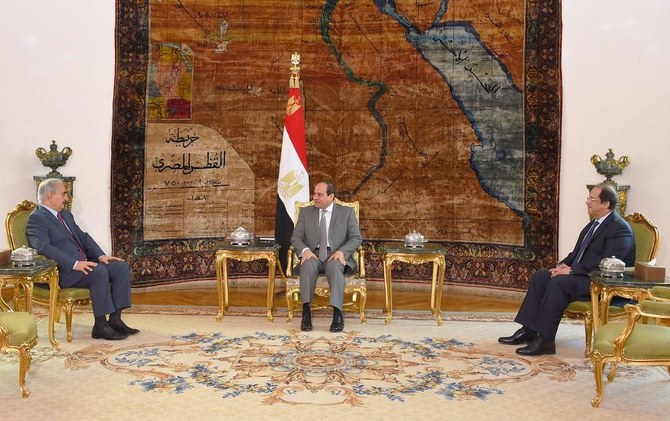
- Haftar’s rivals see him as a dictator who is hoping to rule
- He worked with Qaddafi until he defected in 1980s
Hamas says it received Israel’s response to its ceasefire proposal
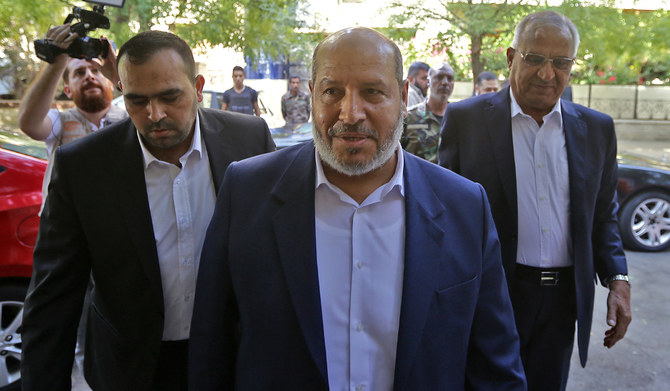
- White House national security adviser Jake Sullivan said on Friday he saw fresh momentum in talks to end the war and return the remaining hostages
CAIRO: Hamas said it had received on Saturday Israel’s official response to its latest ceasefire proposal and will study it before submitting its reply, the group’s deputy Gaza chief said in a statement.
“Hamas has received today the official response of the Zionist occupation to the proposal presented to the Egyptian and the Qatari mediators on April 13,” Khalil Al-Hayya, who is currently based in Qatar, said in a statement published by the group.
After more than six months of war with Israel in Gaza, the negotiations remain deadlocked, with Hamas sticking to its demands that any agreement must end the war.
An Egyptian delegation visited Israel for discussion with Israeli officials on Friday, looking for a way to restart talks to end the conflict and return remaining hostages taken when Hamas fighters stormed into Israeli towns on Oct. 7, an official briefed on the meetings said.
The official, who spoke on condition of anonymity, said Israel had no new proposals to make, although it was willing to consider a limited truce in which 33 hostages would be released by Hamas, instead of the 40 previously under discussion.
On Thursday, the United States and 17 other countries appealed to Hamas to release all of its hostages as a pathway to end the crisis.
Hamas has vowed not to relent to international pressure but in a statement it issued on Friday it said it was “open to any ideas or proposals that take into account the needs and rights of our people.”
However, it stuck to its key demands that Israel has rejected, and criticized the joint statement issued by the USand others for not calling for a permanent ceasefire and the withdrawal of Israeli forces from Gaza.
White House national security adviser Jake Sullivan said on Friday he saw fresh momentum in talks to end the war and return the remaining hostages.
Citing two Israeli officials, Axios reported that Israel told the Egyptian mediators on Friday that it was ready to give hostage negotiations “one last chance” to reach a deal with Hamas before moving forward with an invasion of Rafah, the last refuge for around a million Palestinians who fled Israeli forces further north in Gaza earlier in the war.
Meanwhile, in Rafah, Palestinian health officials said an Israeli air strike on a house killed at least five people and wounded others.
Hamas fighters stormed into Israeli towns on Oct. 7, killing 1,200 people and capturing 253 hostages. Israel has sworn to annihilate Hamas in an onslaught that has killed more than 34,000 Palestinians.
Yemen’s Houthis say their missile hit Andromeda Star oil ship in Red Sea
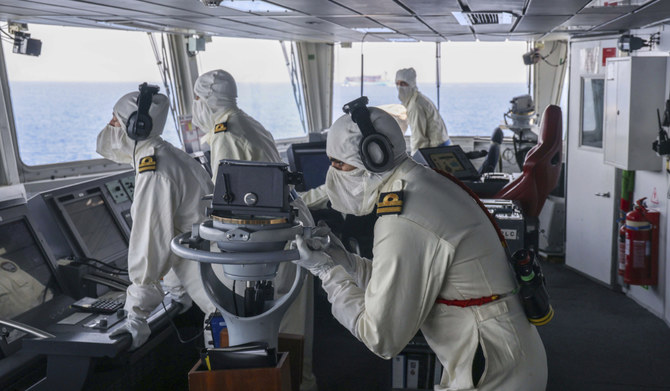
- Israel has killed more than 34,000 Palestinians, according to Gaza’s Health Ministry
- The Houthis on Friday said they downed an American MQ-9 drone in airspace of Yemen’s Saada province
CAIRO/LOS ANGELES: Yemen’s Houthis said on Saturday their missiles hit the Andromeda Star oil tanker in the Red Sea, as they continue attacking commercial ships in the area in a show of support for Palestinians fighting Israel in the Gaza war.
The ship’s master reported damage to the vessel, British maritime security firm Ambrey said.
Houthi spokesman Yahya Sarea said the Panama-flagged ship was British owned, but shipping data shows it was recently sold, according to LSEG data and Ambrey.
Its current owner is Seychelles-registered. The tanker is engaged in Russia-linked trade. It was en route from Primorsk, Russia, to Vadinar, India, Ambrey said.
Iran-aligned Houthi militants have launched repeated drone and missile strikes in the Red Sea, Bab Al-Mandab Strait and Gulf of Aden since November, forcing shippers to re-route cargo to longer and more expensive journeys around southern Africa and stoking fears the Israel-Hamas war could spread and destabilize the Middle East.
The attack on the Andromeda Star comes after a brief pause in the Houthis’ campaign that targets ships with ties to Israel, the United States and Britain.
The USS Dwight D. Eisenhower aircraft carrier sailed out of the Red Sea via the Suez Canal on Friday after assisting a US-led coalition to protect commercial shipping.
The Houthis on Friday said they downed an American MQ-9 drone in airspace of Yemen’s Saada province.
Syrian woman is jailed for life over Istanbul killer blast; over 20 others also get prison sentences
Syrian woman is jailed for life over Istanbul killer blast; over 20 others also get prison sentences
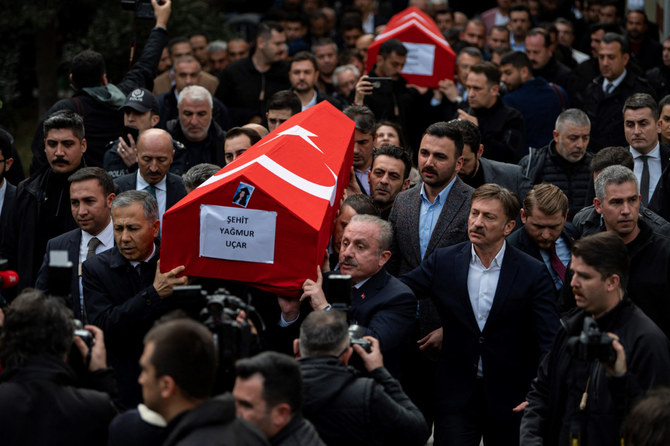
- Ahlam Albashir was given a total of seven life sentences by a Turkish court for carrying out the attack in Istiklal Avenue on Nov. 13, 2022
- Twenty others were given prison sentences ranging from four years to life
JEDDAH: A Syrian woman who planted a bomb that killed six people in Istanbul’s main shopping street 18 months ago was jailed for life on Friday.
Ahlam Albashir was given a total of seven life sentences by a Turkish court for carrying out the attack in Istiklal Avenue on Nov. 13, 2022. Six Turkish citizens, two members each from three families, died in the blast in the busy street packed with shoppers and tourists. About 100 people were injured.
More than 30 other people were accused in connection with the explosion. Four were released from prison on Friday, and a further 10 were ordered to be tried separately in their absence because they could not be found.
Twenty others were given prison sentences ranging from four years to life. Of those, six received aggravated life imprisonment for murder and “disrupting the unity and integrity of the state.”
Turkiye blamed Kurdish militants for the explosion, and said the order for the attack was given in Kobani in northern Syria, where Turkish forces have conducted operations against the Syrian Kurdish YPG militia in recent years.
The YPG and the outlawed PKK Kurdish separatist group, which has fought a decades-old insurgency against the Turkish state, denied involvement in the attack. No group admitted it.
Istanbul has been attacked in the past by Kurdish, Islamist and leftist militants. A wave of bombings and other attacks began nationwide when a ceasefire between Ankara and the PKK broke down in mid-2015.
More than 40,000 people have been killed in the PKK’s conflict with Turkiye since the militant group took up arms in 1984. It is considered a terrorist organisation by Turkiye, the EU and the US.
1 case dismissed, 4 on hold in UN investigation into Oct. 7 allegations against UNRWA staff
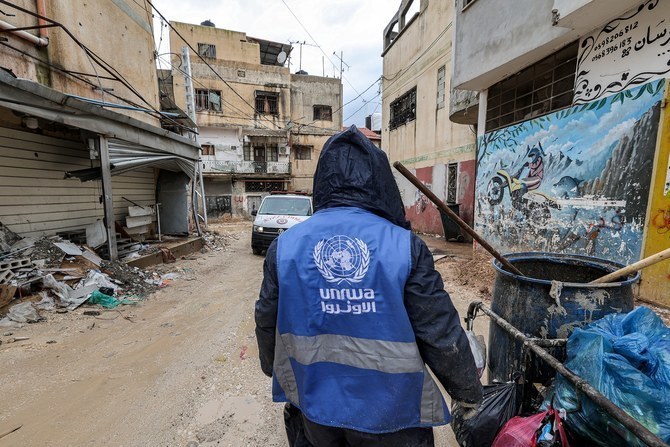
- Investigators have been looking into cases of 12 agency workers accused by Israel in January of participating in attacks by Hamas, and 7 others named later
- 14 cases remain under investigation but the others were dismissed or suspended due to lack of evidence; UN’s internal investigators due to visit Israel again in May
NEW YORK CITY: UN spokesperson Stephane Dujarric said on Friday that the organization’s internal oversight body has been investigating 19 employees of the UN Relief and Works Agency for Palestine Refugees over allegations that they were affiliated with Hamas and other militant groups.
Israeli authorities alleged in January that 12 UNRWA workers participated in the Oct. 7 attacks by Hamas against Israel.
The agency immediately cut ties with the named individuals, and UN Secretary-General Antonio Guterres, in consultation with UNRWA Commissioner General Philippe Lazzarini, ordered an independent review to evaluate the measures taken by the agency to ensure adherence to the principle of neutrality and how it responds to allegations of breaches of neutrality, particularly in the challenging context of the situation in Gaza.
In a wide-ranging report published this week, the investigators, led by Catherine Colonna, a former foreign minister of France, said Israeli authorities have yet to provide any evidence to support the allegations against UNRWA workers. They also noted that Israel had not previously raised concerns about any individuals named on the agency staffing lists it has been receiving since 2011.
They stated in the report: “In the absence of a political solution between Israel and the Palestinians, UNRWA remains pivotal in providing life-saving humanitarian aid and essential social services, particularly in health and education, to Palestinian refugees in Gaza, Jordan, Lebanon, Syria and the West Bank.
“As such, UNRWA is irreplaceable and indispensable to Palestinians’ human and economic development. In addition, many view UNRWA as a humanitarian lifeline.”
Guterres also ordered a separate investigation by the UN’s own Office of Internal Oversight Services to determine the accuracy of the Israeli allegations. The mandate of the OIOS, an independent office within the UN Secretariat, is to assist the secretary-general in the handling of UN resources and staff through the provision of internal audit, investigation, inspection and evaluation services.
Dujarric said the 19 members of UNRWA staff under investigation included the 12 named by the Israeli allegations in January, whose contracts were immediately terminated, and seven others the UN subsequently received information about, five in March and two in April.
Of the 12 employees identified by Israeli authorities in January, eight remain under OIOS investigation, Dujarric said. One case was dismissed for lack of evidence and corrective administrative action is being explored, he added, and three cases were suspended because “the information provided by Israel is not sufficient for OIOS to proceed with an investigation. UNRWA is considering what administrative action to take while they are under investigation.”
Regarding the seven additional cases brought to the attention of the UN, one has been suspended “pending receipt of additional supporting evidence,” Dujarric said.
“The remaining six of those cases are currently under investigation by OIOS. OIOS has informed us that its investigators had traveled to Israel for discussions with the Israeli authorities and will undertake another visit during May.
“These discussions are continuing and have so far been productive and have enabled progress on the investigations.”
The initial allegations against some members of its staff threw the agency, which provides aid and other services to Palestinian refugees in Gaza and across the region, into crisis. The US, the biggest single funder of UNRWA, and several other major donors put their contributions to the organization on hold.
In all, 16 UN member states suspended or paused donations, while others imposed conditions on further contributions, putting the future of the agency in doubt. Many of the countries, including Germany, later said their funding would resume. However, US donations remain on hold.
37 million tonnes of debris in Gaza could take years to clear: UN
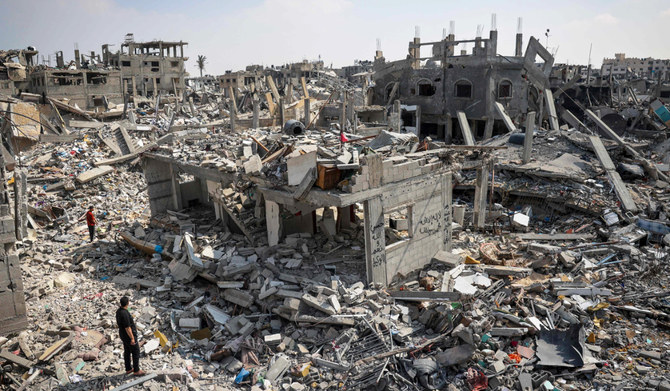
- “We do know that we estimated 37 million tonnes of debris, which is approximately 300 kg per square meter,” Lodhammar added
GENEVA: There are some 37 million tonnes of debris to clear away in Gaza once the Israeli offensive is over, a senior official with the UN Mine Action Service said on Friday.
And unexploded ordnance buried in the rubble would complicate that work, said UNMAS’ Pehr Lodhammar, who has run mine programs in countries such as Iraq.
It was impossible to say how much of the ammunition fired in Gaza remained live, said Lodhammar.
“We know that typically there is a failure rate of at least 10 percent of land service ammunition,” he told journalists in Geneva.

“We do know that we estimated 37 million tonnes of debris, which is approximately 300 kg per square meter,” he added.
He said that starting from a hypothetical number of 100 trucks would take 14 years to clear away.
Lodhammar was speaking as UNMAS launched its 2023 annual report on Friday.
The war in Gaza between Israel and Hamas erupted when Hamas launched an unprecedented attack on Israel on Oct. 7.
Also on Friday, the head of an aid group warned that an Israeli assault on southern Gaza’s Rafah area would spell disaster for civilians, not only in Gaza but across the Middle East,
Jan Egeland said the region faced a “countdown to an even bigger conflict.”
Egeland, the secretary-general of the Norwegian Refugee Council, also said that 1.3 million civilians seeking refuge in Rafah — including his aid group’s staff — were living in “indescribable fear” of an Israeli offensive.
Egeland urged Israeli Prime Minister Benjamin Netanyahu not to proceed with the operation.
“Netanyahu, stop this. It is a disaster not only for the Palestinians, it would be a disaster for Israel. You will have a stain on the Israeli conscience and history forever,” he said.
The NRC head spoke to Reuters in Lebanon, where he visited southern villages that he said were caught in a “horrific crossfire” between the Israeli military and Hezbollah.
“I am just scared that we haven’t learned from 2006,” said Egeland, referring to the month-long war between Hezbollah and Israel that was the two foes’ last bloody confrontation, during which he headed the UN’s relief operations.
“We do not need another war in the Middle East. At the moment, I’m feeling like (this is a) countdown to an even bigger conflict,” he said.



